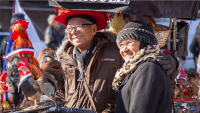Thriving Aging Societies

Social Engagement and Societal Infrastructure
This program is dedicated to the knowledge creation and solutions for transforming societies to successfully age, where longer lives are lived with health and people of all ages benefit from being an aging society, and aging societies are thriving societies. The Aging Society Network, led by Dr. Rowe, has defined the following as key elements of thriving societies of longer lives: cohesion, wellbeing, productivity and engagement and security. The key elements to creation of thriving societies for long lives will be design and investment in the health systems that can best create healthy longevity and meet needs in older age, and in the building of new opportunities through which older people can remain engaged in society and contribute in ways they value, whether through paid work or volunteer service. This will require innovations in societal institutions to design out loneliness and enable the social engagement and social capital, meaning, purpose and beneficial impact of longer lives, and bring dignity to older age and value to all of society. Redesign of environments so that they support wellbeing at all ages is also critical. The evidence indicates that the whole of society transformation to societies that support wellbeing at all ages will be ones that fully benefit from the contributions of older adults and assure that younger generations flourish. These transformations will create a previously unimagined Third Demographic Dividend.
Members
Linda P. Fried, MD, MPH
Dr. Fried is a geriatrician, gerontologist and epidemiologist who has led major population-based studies to define opportunities for prevention of cardiovascular disease, multimorbidity, frailty and disability in aging. Her work defining frailty as a clinical syndrome supports the understanding that engagement and activity as one ages is a vehicle to maintaining health across all dimensions, physical, cognition and socioemotional.
John W. Rowe, MD
Dr. Rowe, the Julius B Richmond Professor of Health Policy and Aging, is a geriatrician / gerontologist who has focused his academic work on Successful Aging at the level of the individual and, more recently, societies. In the late 1980’s Dr Rowe formed and led the decade-long MacArthur Foundation Research Network on Successful Aging an interdisciplinary group of twelve scholars who worked to understand the factors that permit individuals to age successfully.
Key Citations
- Chen C, Goldman D, Zissimopoulos J, Rowe JW & Research Network on an Aging Society (2018) Multi-dimensional comparison of countries’ adaptation to society aging. PNAS, 115(37), 9169-9174. doi.org/10.1073/pnas.1806260115
- Fried LP (2016). Investing in Health to Create a Third Demographic Dividend. The Gerontologist 56(2 Suppl): S167-S177. [ISBN 978 92 4 069481 1]
- Fried LP (2016). Building a Third Demographic Dividend: Strengthening Intergenerational Well-Being in Ways that Deeply Matter. Public Policy & Aging Report 0:1-5. doi:10.1093/ppar/prw015
- Fried LP, Carlson MC, Freedman M, Frick KD, Glass TA, Hill J, McGill S, Rebok GW, Seeman T, Tielsch J, Wasik BA, Zeger S (2004). A Social Model for Health Promotion for an Aging Population: Initial Evidence on the Experience Corps® Model. Journal of Urban Health 81(1):64- 78. PMID: 15047786
- Rehkopf D, Furstenberg FF, Elser H, Jackson C, Levy N, Rowe JW and the Aging Society Network. A US State Index of Successful Aging Differences Between States and Over Time. Milbank Quarterly November 23, 2021. doi.org 10.1111/168-0009.12542